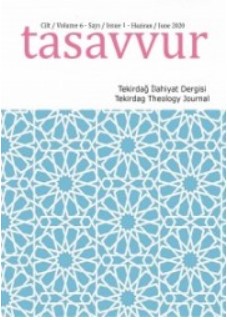Ebü’s-Senâ Şemseddin el-İsfahânî’de Tenzîhî Sıfatlar ve Aklî Arazların Allah’ın Zâtından Tenzîhi
The Concepts of Tanzîh Attributes in Abū al-Sanā al-Iṣfahānī’s Works and the Exemption of the Rational Elements from Allah’ Tanzih Attributes
Author(s): Yusuf ArikanerSubject(s): Islam studies, Philosophy of Middle Ages, 6th to 12th Centuries
Published by: Tekirdağ Namık Kemal Üniversitesi İlahiyat Fakültesi
Keywords: Kalam; Abū al-Sanā al-Iṣfahānī; The notion of Necessary Being; Tanzîh attributes; Rational Positions;
Summary/Abstract: When the history of Kalām is investigated it is notable that there were significant parameters separating it into certain terms. For example, it is well known periodization facts that starting with Cuveyni, the philosophizing of Kalām was strengthened by Ghazali and it reached its peak form by Fakhruddin Razi. At this point, it is important that like formers, one of the scholars lived in the period of the philosophical Kalām was Abū Sanā al-Iṣfahānī. His works related to the methodology of Kalām were regarded as a guideline for Kalām methods. After the integration of the Kalām with philosophy, one of the most visible changes in the methodology of Kalām was that Isfahani followed philosophical methods in the realm of tanzih attributes. It is said that Isfahani tried to express and prove the concept of the tanzih attributes through the notion of Necessary Being (wâjib al-wujûd). As he was said that he was the fan of the tradition that had been put forward by Ibn Sina, his stance about whether Allah, himself can be comprehended by mental terms was closer to the philosophical position instead of the theological science and it also shows that Isfahani adopted some of the ideas of the philosophers. Therefore this article covers Isfahani’s certain ideas related to these concepts. It also reveals his rejections to other’s ideas claimed by scholars like Fakhruddin Razi.
Journal: Tasavvur Tekirdağ İlahiyat Dergisi
- Issue Year: 6/2020
- Issue No: 1
- Page Range: 313-332
- Page Count: 20
- Language: Turkish

